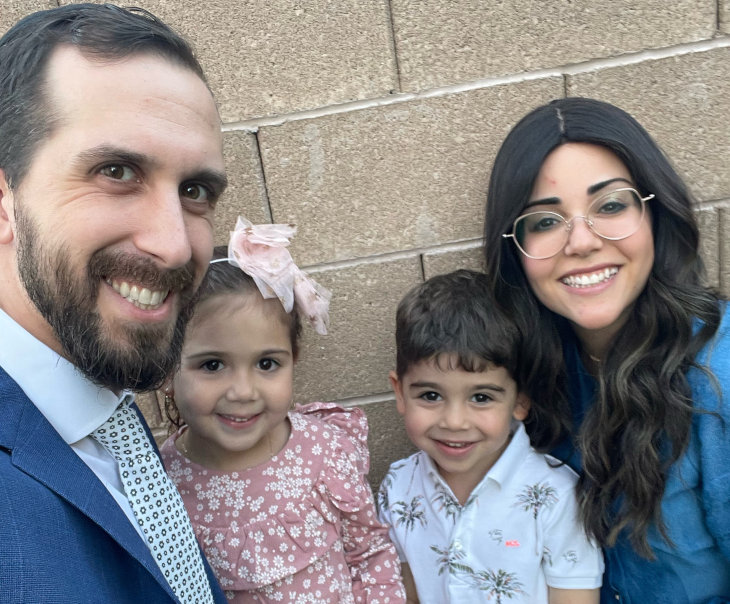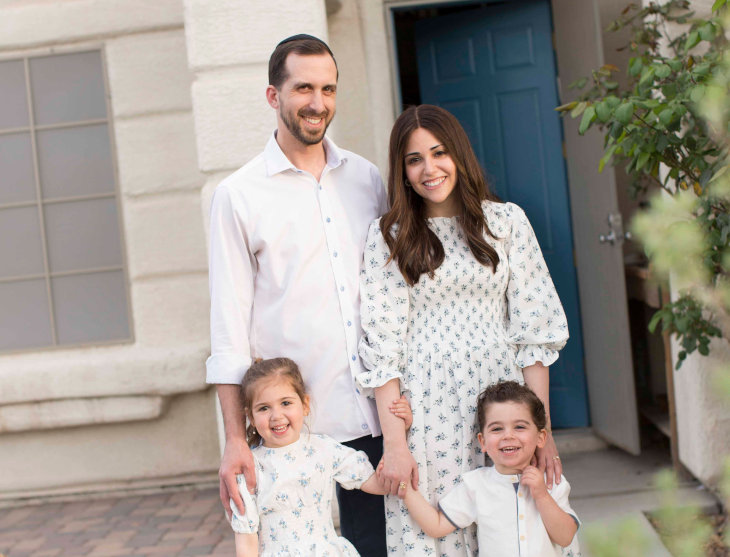 Passover’s Message of Hope in the Aftermath of Oct. 7
Passover’s Message of Hope in the Aftermath of Oct. 7


11 min read
Her priority it to help others and erase the shame surrounding mental illness.
Despite her outward image of perfection, Bari Mitzmann, 30, a successful digital influencer, social media consultant and popular podcast host with tens of thousands of followers, struggled with mental health from a young age.
It was never formally diagnosed, but looking back, she realized she had clear signs of anxiety. During childhood, it manifested as severe stomach aches and muscle pains. As a teen, the signs became more visible and frequent, with shaking, hyperventilating, rocking back and forth and even throwing things.

Shortly after her wedding, Bari was diagnosed with Lyme disease. “I was stuck in the bed and I had to stop working. I was taking tons of medications that were wrecking my body. I had no life. So my mental health was impacted by this.”
As a result of her experiences, she knew she would likely experience postpartum depression, but nothing could prepare her for peripartum depression.
“When I was seven months pregnant with my first child, I lost a close friend to a brain tumor, and I was really down. Before she died, we drove to and from work together every day. One night, shortly after my friend's death, I was lying in bed. It was the middle of the night, and I felt sharp pains from the baby kicking me once again. I thought, if you kick me one more time, I’m going downstairs and cutting you out of my body. That was the moment I realized I needed help.”
She desperately wanted to love her baby, and herself. Getting help was instrumental. She started therapy and medication, and was able to welcome her child happily into the world. Bari’s willingness to get help was due to a friend who openly admitted to seeing a therapist and going on medication while pregnant.
At the time, her social media hobby was getting more serious and starting to take off. She was offered her first collaboration in exchange for free products. “It was just some free belts, but I felt like the cool kid.” The more she posted, the more she grew her platform.
“Even the peripartum depression didn’t stop me. I felt that I had to keep creating content—or else, what was my worth?”
But it quickly became too much to keep up with. “I still pretended everything was fine. But deep down, I was really struggling.”
After having the baby, Bari’s stress levels and feelings of being overwhelmed worsened. But she felt the incessant need to create and post content.
“I got dressed up three days after I gave birth in a vintage dress,” Bari recalled, “all decked in jewelry and makeup. All this while still wearing postpartum underwear.” She kept posting, no matter the toll it was taking on her. Even though she couldn’t get out of bed to handle her personal responsibilities, she somehow managed to in order to take photos to post online.
Bari recalls the moment she realized she couldn’t keep up the façade any longer. “I hadn’t been leaving my house or even getting out of bed. My husband coaxed me out of bed and drove me to Whole Foods. I asked him to take a picture of me in the aisle because I was finally dressed and ‘looked cute.’ It was 6:00 PM. Later that night, I examined the picture and was sorely disappointed with the photo. Motherhood was not a joke, and was taking a toll. My expectations of myself for social media were too high, and I was finally crashing.”
Instead of writing a typical caption, she broke down and wrote:
This picture was taken at 6pm last week. I got out of bed and got dressed for the first time at 4:30pm. I was unmotivated to do anything—eat, work, or take care of my family. Nothing.
Somehow, my husband managed to get me out. I asked him to take a picture, because I needed something for Instagram.
Isn’t that so sad? That I couldn’t function, but out of concerns of gaining and losing followers, I took a picture that makes me seem like life is perfect and dandy. “Hey, look at me shopping, taking care of my baby and looking amazing at the same time. Isn’t my life awesome?” I will not be pretending as much on my account. My pursuit of happiness trumps a digital pursuit of approval.
The response to this post was overwhelming. People thanked Bari for her realness, while others asked for forgiveness for previously being jealous of her “perfect” life.
Another person wrote, “Thank you for making me feel like I am not a failure. Pictures make it seem like you have it all together. I can’t get my life together.”
As an ambassador for many mental health organizations, Bari wants to erase the shame surrounding mental health. She is open about the fact that she and her husband are in therapy together. She posts about things that many wouldn’t discuss.
 Bari and her family
Bari and her family
For example, on her anniversary, she posted, I love you almost as much as I love our marriage counselor. The purpose of that was to dispel the myth that her marriage—or any marriage, for that matter—is perfect.
When she decided to share the fact that she battled Lyme Disease and dealt with bouts of mental health struggles, her followers were supportive.
Bari has boundaries regarding what she is willing to share versus what she keeps quiet. She only shares experiences she has worked through. “The experience can’t be too raw. That way, if someone asks me a question or comments on it, I won’t feel attacked.”
The two questions she asks herself when determining whether to post or not are: Will I be okay if someone challenges, criticizes or hates what I share? Will it help other people?
Bari feels passionate that faith and anxiety are not mutually exclusive. “There is an idea that if you believed God is in control, you wouldn’t get depressed or have anxiety. This is an harmful and flawed perspective. You can have faith in an Almighty and also have a chemical imbalance—or also be human.”
Not all these thoughts are ours. Not all these thoughts are correct. Just because we think it, doesn't mean it is.
Bari shares, “I have learned that I have a body, I have a mind, and I am a soul. I used to intertwine mind and soul as one entity. Sometimes, what I thought was my soul was just trauma or a negative self-image. My soul doesn’t want me to catastrophize things.”
“De-catastrophizing has been freeing. If you think you are your thoughts, that may not be true. Most thoughts are from preconceived notions and subconscious ideas. People don’t realize we take in a lot of information, all the time. And it’s a lot. That is what is forming our thoughts. Not all these thoughts are ours. Not all these thoughts are correct. Just because we think it, doesn't mean it is.”
Some thoughts she still battles today are:
You are just trying to get attention.
You are a fake.
You are a terrible mother.
You are a terrible wife.
Bari realized faking it could only take her so far. She started working through her emotions in therapy that was based on spiritual enlightenment. “A lot of my relationship with God was based on fear of retribution. Many people saw me as an inspirational person. I just kept thinking, ‘Oh great, I’m a fraud.’”
Bari had to retrain her brain to have a healthy perspective on her life, her choices, and her religion.
“When there is a lot going on and I don’t feel capable, my body reacts. It starts with tightening in my chest. My hands start shaking. My heart starts beating fast and it gets hot. Then my thoughts get quicker and quicker. They may not be specific, but I feel a strong urgency to get out.
“I sometimes start thinking things like, If you don’t get this done or you’re not contributing then you’re a failure. Initially, my therapist would help me decode these thoughts and feelings. Now, I have gotten better at it and can usually help myself out of these moments.

For Bari , self-care is a priority. “I’m so busy taking care of everyone else that I forget myself sometimes. For me, self-care is Yoga class, breathing slowly, taking a bath. I’m a sensory person, so I make sure to have comforting sensory objects nearby.”
She also gives herself permission to sit in her feelings and know that she can and will move on. She uses distraction and grounding techniques, as well. She will use her senses to state what she is feeling, what she is seeing, and what she is touching to bring her back to reality.
Bari believes mental health is something everyone struggles with, to some degree. “Just because I have a label doesn’t make me any worse off than anyone else. There is lots of shame associated with mental health. But there shouldn’t be. There is no shame in an arm being broken. It doesn’t make them any less of a person, but they need to wear a cast and take care of themselves. So too, mental illness requires that one do what they can to be in the best place possible.”
She points to Kanye West as an example of the consequences of poor mental health.
“Kanye’s antisemitic comments are horrific and have catastrophic consequences. When one is in a bad mental state, it’s easy to gravitate toward extreme ideologies. This is not the first time that he has come out stating horrific things about groups of people, and likely will not be the last. Mentally ill or otherwise, Kanye knows who the social scapegoats are and he needs to be held accountable. We don’t excuse terrible behavior with mental illness, and he can’t hide behind any diagnosis.
“Additionally, Kanye West is doing the opposite of what I encourage other people to do when they are going through a mental health crisis. He has had a long history of mental health struggles, and instead of getting the help that he needs and staying off social media during the time that he needs healing, he is using it once again to damage people. In his case, the damage is enormous. Many of his followers don't realize this is likely a manic episode. Some people are seeing this as truth, inspiration, and genius. The man needs urgent help.”
Today Bari is in a good place. She wants the world to know there is hope and there is light. “People don’t see me as a mentally ill person. Rather, they see me as a wife, a mother, a successful Jewish woman. One woman told me that because I shared my story, she isn’t embarrassed anymore of her struggle. Mental illness doesn’t have to be the defining factor of your life.”

She advises those struggling with mental health issues to get help and support. “Having the courage to ask and open up and share with someone you trust and care about is a great first step. Getting stuck inside your head can be a really dangerous and scary place.”
“If you have a friend or family member who struggles with mental illness, try to be a support beam for them. I had a friend who reached out to me when I was struggling by asking, ‘How can I be here for you?’ She did not say, ‘If you need anything, let me know.’ She asked a direct question. She was the type of person that meant it, so I asked her for specific help.”
Small, deliberate gestures can have an enormous impact on those who are struggling, and we can all benefit from feeling seen by those who care for us—not just our followers, however large or small that group may be.
Bari can be reached at: @barianna and @womanofvalorpodcast on Instagram
Email bari@barianna.com or via her website barianna.com
